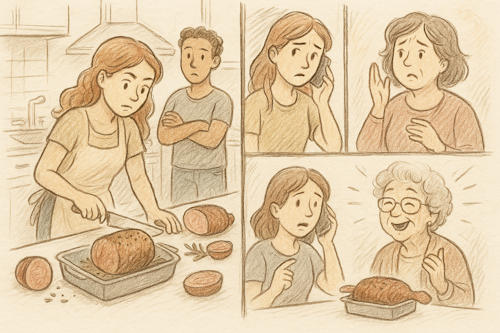The Pot Roast Story
Illustrates Legacy Practices, Unquestioned Rituals
Many Agile teams operate under constraints they never question. Ceremonies, reports, or rules persist not because they serve a purpose, but because "that's how we've always done it". The Pot Roast Story is a humorous reminder that without curiosity, tradition becomes a trap. This parable helps Scrum Masters, coaches, and leaders examine inherited practices and design systems with intention.

A young woman was preparing a family dinner for the first time and decided to make her grandmother's pot roast. Following the recipe she'd learned growing up, she cut off both ends of the roast, seasoned it, and placed it in the pan to cook.
Her partner, watching from across the kitchen, asked, “Why do you cut off the ends?”
She paused. “That's how my mom always did it.”
Curious, she called her mom. “Why do we cut the ends off the pot roast?”
Her mom replied, “Because that's how Grandma always did it.”
Still puzzled, she called Grandma.
“Grandma, why do you cut off the ends of the pot roast?”
Grandma laughed. “Oh, honey, I only did that because my pan was too small.”
Lessons Learned
Not All Traditions Have Purpose
Some practices live on long after the original need disappears. Agile teams inherit processes, templates, and policies from past versions of themselves or previous leaders. Without examination, teams may spend time and effort preserving inefficiencies.
Habit Is Not Strategy
What begins as a workaround can harden into a rule. When teams assume the way things are is the way things must be, they stop exploring better options. Healthy teams question their own rituals and invite regular reflection.
Context Is Everything
Grandma's choice made sense in her situation. But when context changes, new tools, new people, new goals, our methods should evolve too. Agile values adaptiveness, not blind adherence to outdated constraints.
Assumptions Block Learning
The young woman assumed the step was essential. So did her mom. Assumptions limit experimentation. Agile thinking challenges teams to seek first principles and validate beliefs before accepting them as truths.
Waste Hides In Plain Sight
Cutting off the ends of the roast wastes good meat. Many Agile teams waste time on unused reports, unproductive meetings, or outdated handoffs. Small frictions often go unchallenged. Over time, they drain focus and morale.
Coaching Tips
- Use this Story in Retrospectives: Invite teams to identify their “pot roasts”, habits or steps no one has questioned in a while.
- Pair with Value Stream Mapping: Map team workflows and highlight actions that don't contribute directly to value. Ask, “Do we need this? Why did it start?”
- Visualize Collective Contribution: In retros or workshops, draw a “soup pot” and invite team members to write down what they're contributing to team success. It reinforces shared purpose.
- Encourage 'Stop Doing' lists: Often teams keep adding more. This parable helps normalize removing what no longer serves the team or customer.
- Challenge Inherited Process: When onboarding new team members, use the story to signal that curiosity and questions are welcome.
The Pot Roast Story isn't just a humorous tale. It is a challenge to reflect. Agile isn't about following rituals. It's about choosing practices that serve a purpose. Teams grow stronger not by doing more, but by doing what matters and letting go of what doesn't.
If your team is stuck in habit, it may be time to ask: “Is our pan still that small?”


